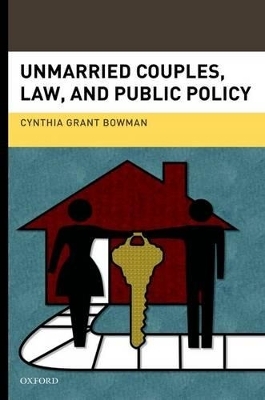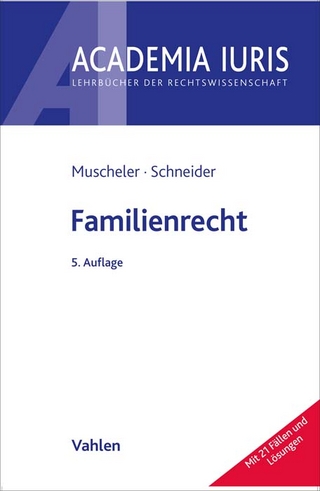
Unmarried Couples, Law, and Public Policy
Oxford University Press Inc (Verlag)
978-0-19-537227-4 (ISBN)
The author argues that the many benefits attendant upon formal marriage should be extended to cohabitants who have lived together for more than two years or give birth to a child. In order to avoid these consequences, a couple would need to opt out of them by contract.
Professor Bowman reaches this conclusion after a thorough review of the history of the legal treatment of cohabitation in the United States, the inadequacy of the legal remedies available to cohabitants in most states, the now-voluminous social science literature about cohabitation, and the experience of six other countries (England, Canada, Australia, France, The Netherlands, and Sweden) that have attempted a variety of legal reforms to address the problems of cohabitants.
Cynthia Grant Bowman is the Dorothea S. Clarke Professor of Feminist Jurisprudence at Cornell Law School. A graduate of Swarthmore College, she has a Ph.D. in political science from Columbia University and a J.D. from Northwestern University School of Law. She has published widely in diverse areas of family law and other topics concerning law and gender.
Preface and Acknowledgements i
Introduction 1
Chapter 1 Cohabitation in the United States: The Past 12
Criminalization of Cohabitation 13
Common Law Marriage and Related Fictions 23
Denial of Benefits to Cohabitants: A Case Study of Illinois 31
The Inadequacy of Equitable Remedies 43
Chapter 2 Legal Treatment of Cohabitation in the United States Today 52
Cohabitants' Rights Based on Contract 53
Cohabitants' Rights Based on Status 60
Meretricious Relationships in Washington 60
Domestic Partnership Laws 67
Rights Against Third Parties 78
Benefits from the State 79
Tort Claims against Third Parties 83
Health-Related Benefits 89
Cohabitants and Their Children 91
Chapter 3 Cohabitation in the United States Today 104
The 1960s 104
Change over Time 108
Statistics 108
Rate and Age of Marriage 110
Predictions 112
Who Cohabits and Why? 114
College Students and Young Dating Singles 114
Variations by Income 118
Variation by Race and Ethnic Group: African Americans 124
Variation by Race and Ethnic Group: Latino/as 127
Divorced Persons 131
The Elderly 132
Other Characteristics 134
Chapter 4 Social Science and Cohabitation 138
The Pioneers 138
Trends in the Literature 140
What Social Science Has Told us about Cohabitation 144
Duration of Cohabiting Unions 144
The Economics of Cohabiting Relationships 151
Management of money within cohabiting relationships 152
The impact of cohabitation upon the economic well-being
of the partners and their children 155
Division of household labor between cohabitants 158
Quality of the Relationship 161
Domestic Violence and Cohabitation 166
Impact of Cohabitation on Children 175
What We Know: A Summary 185
Implications of the Social Science Findings 187
Chapter 5 Treatment of Cohabitation in Other Nations 191
England: Non Recognition and Piecemeal Benefits 193
Canada: The New Common Law Marriage? 206
De Facto Relationship in Australia 216
The Netherlands: A Cafeteria Approach to Cohabitants' Rights 224
France: Concubinage and the Pacte Civil de Solidarité 230
Sweden and Neutrality between Cohabitation and Marriage 239
Chapter 6 A New Law for Cohabitants in the United States 247
Recommendations for Reform of U.S. Law 250
Imposition by Law of Quasi-marital Status on Cohabitants
after Two Years or a Child 250
A System of Registration for Domestic Partnerships 255
The Ability of Cohabitants to Contract Out of Obligations 256
The Impact of the Proposed Reforms on Marriage 258
Incentives and Marriage 258
Cross-historical and Cross-national Comparisons 262
The Impact of the Proposed Reforms on Various Groups of Cohabitants 267
Conclusion 272
Bibliography 274
Index
| Erscheint lt. Verlag | 1.5.2010 |
|---|---|
| Verlagsort | New York |
| Sprache | englisch |
| Maße | 254 x 178 mm |
| Gewicht | 680 g |
| Themenwelt | Recht / Steuern ► EU / Internationales Recht |
| Recht / Steuern ► Privatrecht / Bürgerliches Recht ► Familienrecht | |
| Sozialwissenschaften ► Soziologie | |
| ISBN-10 | 0-19-537227-1 / 0195372271 |
| ISBN-13 | 978-0-19-537227-4 / 9780195372274 |
| Zustand | Neuware |
| Informationen gemäß Produktsicherheitsverordnung (GPSR) | |
| Haben Sie eine Frage zum Produkt? |
aus dem Bereich


